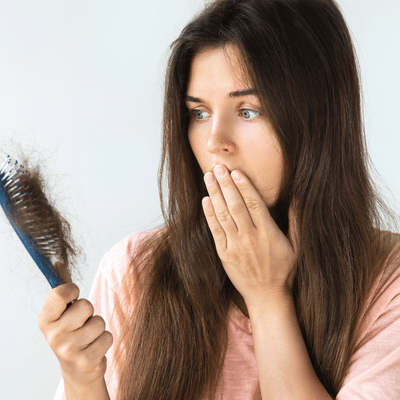The main factors affecting hair growth are genetics
PURE KERATIN on 4th Dec 2023
The Main Factors Affecting Hair Growth Are Genetics
Hair growth is a complex phenomenon influenced by various factors, with genetics playing a pivotal role. Understanding the interplay between genetics and hair growth can empower individuals seeking to optimize their hair health.
Introduction
Hair is more than just a physical attribute; it reflects one's identity, personality, and confidence. Genetics stands as a cornerstone in the realm of hair growth, dictating its patterns, density, texture, and susceptibility to certain conditions. While genetics lay the foundation, several other factors also contribute significantly to the overall health and growth of hair.
Understanding Genetics and Hair Growth
Genetic Influence on Hair Growth
Genetics predominantly determines the characteristics of hair follicles. The genetic code inherited from parents defines the hair growth cycle, which comprises the growth phase (anagen), transition phase (catagen), and resting phase (telogen). Variations in these phases directly impact hair length, thickness, and shedding patterns.
Role of DNA in Hair Growth
DNA, the genetic blueprint of every individual, orchestrates the production of proteins and enzymes vital for hair growth. Genetic variations influence the synthesis of keratin, the primary protein in hair strands, affecting its strength and structure. Moreover, genes regulate hormonal levels, which play a crucial role in hair growth regulation.
Other Influencing Factors
Environmental Factors
Environmental elements such as pollution, UV radiation, and climate conditions can impact hair health. Exposure to pollutants and harsh weather conditions may weaken hair strands, leading to breakage and stunted growth.
Lifestyle and Habits
Unhealthy lifestyle choices like excessive stress, smoking, poor nutrition, and inadequate sleep can hinder hair growth. Proper hydration, balanced nutrition, and adequate rest are fundamental for optimal hair health.
Healthy Practices for Hair Growth
Diet and Nutrition
A balanced diet rich in essential nutrients like vitamins (A, B, C, D, E), minerals (iron, zinc), and proteins promotes healthy hair growth. Incorporating foods like leafy greens, nuts, eggs, and fish can enhance hair strength and vitality.
Proper Hair Care Routine
Maintaining a gentle hair care regimen involving regular washing, conditioning, and minimal heat exposure can prevent damage and promote healthy growth.
Stress Management
High stress levels can disrupt hormonal balance, leading to hair loss. Techniques such as meditation, yoga, and adequate relaxation can alleviate stress and support hair health.
Myths vs. Facts About Hair Growth
Debunking Common Myths
Contrary to popular belief, frequent hair trimming does not directly accelerate hair growth. Cutting hair does aid in eliminating split ends, enhancing the appearance of hair, but it doesn't affect the rate of growth.
Validating Facts
Healthy hair growth primarily relies on internal factors such as genetics, diet, and overall health. While external treatments and products may improve appearance, their impact on actual growth remains limited.
Technological Advances in Hair Growth
Emerging Technologies
Scientific advancements, including laser therapy, PRP treatments, and stem cell research, show promise in stimulating hair follicles and promoting growth.
Scientific Breakthroughs
Researchers are exploring genetic editing and regenerative medicine to address genetic factors directly impacting hair growth, offering hope for more personalized solutions.
Conclusion
The intricate interplay of genetics and various influencing factors significantly impacts hair growth. While genetics set the foundation, nurturing hair health through proper nutrition, care, and lifestyle choices plays a crucial role in optimizing growth and maintaining healthy, vibrant hair.
FAQs
- Can I change my genetic predisposition for hair growth?
- Do hair growth supplements effectively alter genetic influences?
- Are expensive hair treatments solely reliant on genetics for their effectiveness?
- How long does it take for genetic changes to reflect in improved hair growth?
- Are there specific foods that can counteract genetic limitations for hair growth?
Here are answers to those questions:
- Can I change my genetic predisposition for hair growth?
Your genetic code lays down the blueprint for your hair, but it doesn’t seal your fate. While you can't rewrite your genes, you have the power to influence their expression. Your lifestyle choices, care regimen, and nourishment can significantly impact how your genetic predisposition manifests in your hair. Think of it as tending to a garden—you can't change the seeds, but you can create an environment where they thrive.
- Do hair growth supplements effectively alter genetic influences?
Hair growth supplements may promise miracles, but they don’t rewrite your genetic code. However, they can complement your efforts by providing essential nutrients that support overall hair health. These supplements nurture your hair from the inside, aiding in its strength and vitality. Remember, while they're beneficial, they work in tandem with a holistic approach to hair care.
- Are expensive hair treatments solely reliant on genetics for their effectiveness?
Expensive treatments often tout remarkable results, but their effectiveness isn't solely dependent on genetics. These treatments, whether advanced technologies or specialized procedures, can enhance the appearance and health of your hair. However, their success is also influenced by your hair's current condition, the expertise of professionals administering the treatment, and how well you complement these treatments with a healthy lifestyle and care routine.
- How long does it take for genetic changes to reflect in improved hair growth?
Genetic changes don’t manifest overnight. Just as Rome wasn’t built in a day, noticeable alterations in hair growth due to genetic changes take time. It’s a gradual process. Consistency in adopting healthy practices, be it nutrition, care, or stress management, is key. With patience and persistence, you'll gradually witness the fruits of your efforts reflected in improved hair growth and quality.
- Are there specific foods that can counteract genetic limitations for hair growth?
While you can’t completely override your genetic limitations through food alone, a nutrient-rich diet can work wonders for your hair. Certain foods, packed with vitamins, proteins, and minerals, support your hair's strength and growth. Consider including leafy greens, nuts, fish, and eggs in your meals. These aren’t magical fixes, but they provide the nourishment your hair needs to thrive despite genetic predispositions.
Remember, while genetics play a significant role, your active involvement in nurturing your hair can positively influence its growth and health. It’s about creating the optimal environment for your hair to flourish.



















